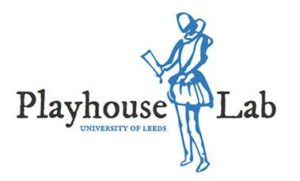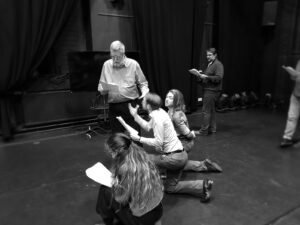 Playhouse Lab is a play-reading group, which meets regularly in the Workshop Theatre of the University of Leeds to explore early modern plays in script-in-hand performances. It is co-convened by José A. Pérez Díez and Jane Rickard, and Brett Greatley-Hirsch manages the website. Our regular readers include members of academic staff; current undergraduate and postgraduate students; and former students and colleagues. We have also welcomed guest readers from other universities, including Sheffield, York, Liverpool, Hull, Glasgow, and Edinburgh. We encourage active participation but also welcome those who wish simply to watch. The aim of the group is collectively to get to know the plays through embodied reading, seeing how they work on stage. We have been running since 2016 (including running regular sessions online during the Covid-19 pandemic) and have found that Playhouse Lab has many benefits for staff and students. Below we provide more information about what we do and why!
Playhouse Lab is a play-reading group, which meets regularly in the Workshop Theatre of the University of Leeds to explore early modern plays in script-in-hand performances. It is co-convened by José A. Pérez Díez and Jane Rickard, and Brett Greatley-Hirsch manages the website. Our regular readers include members of academic staff; current undergraduate and postgraduate students; and former students and colleagues. We have also welcomed guest readers from other universities, including Sheffield, York, Liverpool, Hull, Glasgow, and Edinburgh. We encourage active participation but also welcome those who wish simply to watch. The aim of the group is collectively to get to know the plays through embodied reading, seeing how they work on stage. We have been running since 2016 (including running regular sessions online during the Covid-19 pandemic) and have found that Playhouse Lab has many benefits for staff and students. Below we provide more information about what we do and why!
What kinds of sessions do we run?
Performances
- improvised, text-in-hand performances of complete plays (this is our most commonly used format)
- semi-rehearsed, text-in-hand performances of complete plays (this is usually our ‘end of year special’)
Workshops
- introduction to performance/performance skills development through warm-up exercises and group work (we usually do this at the start of the year with new students)
- improvised, text-in-hand performances of selected scenes from a single play, interspersed with discussion (this is a good format for helping undergraduate students with module texts)
- exploration of a particular issue or topic in a given play or group of plays (this is a good format for helping postgraduate researchers to develop an aspect of their research)
Special events
- symposia centring on the performance of a play
- outreach sessions
What are the benefits of Playhouse Lab?
Research
- gives us a chance to get to know a wider range of non-canonical plays and to gain new perspectives on familiar ones
- allows us to ‘road-test’ editions of early modern plays being prepared by participants and provide useful feedback; most recently we read Brett Greatley-Hirsch’s text of the anonymous play Fair Em, which he is preparing for Digital Renaissance Editions
- enables us to explore specific research questions about staging and performance; for example, Sam Jermy led a workshop on Thomas Middleton and Thomas Dekker’s The Roaring Girl, which explored the performance of gender in terms of both cross-dressing within plays and cross-casting in our own practice; and Jane Rickard led a workshop on Ben Jonson’s Sejanus, focusing on how working with parts rather than whole scripts changes the dynamics of performance
- gives us insights into how early modern playing companies and repertoires worked; for example, regular participants often end up taking on a series of similar roles, which can bring out connections and parallels between plays
Teaching
- gets students exploring the plays in terms of performance, thinking about the different choices that can be made at every moment
- demystifies the plays, helping students to see the texts as working documents rather than as finished artefacts, and gives insights into the processes of scholarly editing
- can be a helpful way of exploring sensitive issues that the plays raise, such as violence and misogyny
- inspires students with greater enthusiasm for the material (none has ever left a session saying that they liked a play less!)
- gives students the opportunity to build their confidence and teamwork skills
- helps to break down barriers between students and staff, showing students that we are all still learning, and that we learn through asking questions, trying ideas out, evaluating different perspectives, and so on
Outreach
- gives a ready-made structure for creating exciting outreach events; ours have included workshops for schools and a session at the Ilkley Literature Festival
Plus
- The best thing about Playhouse Lab is not reducible to any of the above categories; it is the sense of community that it creates. It brings together a mixed group of people, often ranging from undergraduates to retired professors, in a non-hierarchical environment in which everyone is experimenting, learning, and enjoying early modern drama!
Future plans
 We are keen to involve more researchers and students from different institutions in our activities! Events scheduled for the academic year 2023-2024 include a symposium on The Merchant of Venice, featuring a professional performance: Gareth Armstrong’s acclaimed one-man show Shylock. You can find out more about the symposium and register here. We would also like to help early modern colleagues at other institutions interested in setting up their own play-reading groups. If you’d like to discuss ideas, or to get some tips, please get in touch!
We are keen to involve more researchers and students from different institutions in our activities! Events scheduled for the academic year 2023-2024 include a symposium on The Merchant of Venice, featuring a professional performance: Gareth Armstrong’s acclaimed one-man show Shylock. You can find out more about the symposium and register here. We would also like to help early modern colleagues at other institutions interested in setting up their own play-reading groups. If you’d like to discuss ideas, or to get some tips, please get in touch!
Contacts
You can find out more about Playhouse Lab at our website: https://www.playhouselab.org/ . You are welcome to contact the co-conveners, José A. Pérez Díez (J.A.PerezDiez@leeds.ac.uk) and Jane Rickard (j.rickard@leeds.ac.uk).
